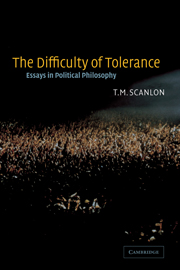Book contents
- Frontmatter
- Contents
- Acknowledgments
- Introduction
- 1 A theory of freedom of expression
- 2 Rights, goals, and fairness
- 3 Due process
- 4 Preference and urgency
- 5 Freedom of expression and categories of expression
- 6 Human rights as a neutral concern
- 7 Contractualism and utilitarianism
- 8 Content regulation reconsidered
- 9 Value, desire, and quality of life
- 10 The difficulty of tolerance
- 11 The diversity of objections to inequality
- 12 Punishment and the rule of law
- 13 Promises and contracts
- Index
4 - Preference and urgency
Published online by Cambridge University Press: 15 December 2009
- Frontmatter
- Contents
- Acknowledgments
- Introduction
- 1 A theory of freedom of expression
- 2 Rights, goals, and fairness
- 3 Due process
- 4 Preference and urgency
- 5 Freedom of expression and categories of expression
- 6 Human rights as a neutral concern
- 7 Contractualism and utilitarianism
- 8 Content regulation reconsidered
- 9 Value, desire, and quality of life
- 10 The difficulty of tolerance
- 11 The diversity of objections to inequality
- 12 Punishment and the rule of law
- 13 Promises and contracts
- Index
Summary
Arguments in moral philosophy frequently turn on appeals to some standard on the basis of which the benefits and sacrifices of different people can be compared. In applying principles of distributive justice, for example, we must appeal to some standard of this kind as a ground for measuring the equality or inequality of shares, and similar appeals must be made in defending systems of rights, and institutionally defined prerogatives and protections. Such appeals to the comparison of benefits and burdens will of course be most direct in those theories which are, broadly speaking, utilitarian, but they also play a crucial role in theories that diverge from utilitarianism. Comparisons of this kind are, for example, crucial to the argument from Rawls's Original Position, and, in general, criteria of relative well-being and relative sacrifice will have a central place in any moral theory that does not start with a system of rights taken as standing in need of no defense.
In this paper I want to describe and discuss some problems concerning the way in which criteria of well-being are to be formulated and defended and the ways in which they enter into moral arguments. Let me begin by stating some properties which it seems that criteria of well-being should have if they are to play the role commonly assigned to them in moral argument.
- Type
- Chapter
- Information
- The Difficulty of ToleranceEssays in Political Philosophy, pp. 70 - 83Publisher: Cambridge University PressPrint publication year: 2003
- 3
- Cited by



